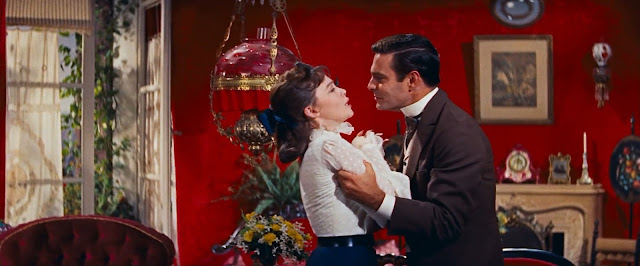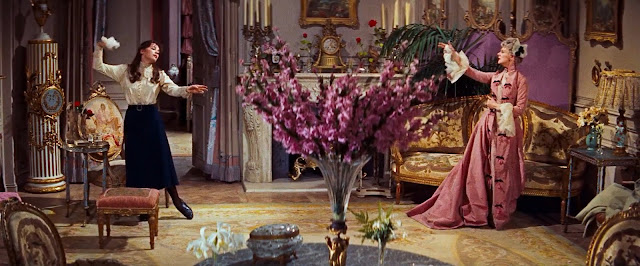 |
| Gaston (Louis Jourdan) is shocked to discover that he has feelings for young Gigi (Leslie Caron). |
Release Date: May 15, 1958. Running Time: 115 minutes. Music: Frederick Loewe. Screenplay: Alan Jay Lerner. Based on the novella by Colette. Producer: Arthur Freed. Director: Vincente Minnelli.
THE PLOT:
Gigi (Leslie Caron) is a teenager who lives in Paris at the turn of the 20th century. She spends her days being trained by her Aunt Alicia (Isabel Jeans) and her grandmother (Hermione Gingold) to attract the right kind of man, with lessons including how to sit, how to eat certain high-class (but unappetizing) foods, and how to spot the difference between valuable jewels and worthless ones.
Gaston (Louis Jourdan) is a friend of the family's. From the outside, he seems to enjoy a carefree life of beautiful women, luxury cars, and endless parties... except that he's bored with all of it. When his uncle Honoré (Maurice Chevalier) reminds him of the women, he shrugs: "It's either yes or no; and if it's no or if it's yes, it simply couldn't matter less."
The only time Gaston isn't bored is with Gigi. She has as much disdain for her lessons as he has for his lifestyle. She merrily insults him and cheats at cards, all of which he finds charming. Gigi's grandmother thinks nothing of it... but when Aunt Alicia learns how carefree they are together, she realizes that Gigi is no longer a child, and sets in motion a plan for Gigi to become Gaston's courtesan!
 |
| Honoré (Maurice Chevalier) attempts to cheer up Gaston. |
CHARACTERS:
Gigi: Leslie Caron's singing voice was dubbed, but she does a fine job of acting. Gigi is instantly likable, her disdain for the comedy of manners surrounding her instantly relatable. She's brimming with personality, particularly in her interactions with Gaston, whether teasing him or cheating him at cards. Caron has excellent chemistry with co-star Louis Jourdan, which helps to sell a love story that might well be seen as unsavory.
Gaston: He declares everything about Paris society and its social games to be "a bore" (he's right), and he grimaces through parties with the enthusiasm of a condemned man on the way to his execution. About the only times he seems happy are with Gigi and her grandmother. Compare his morose singing of She Is Not Thinking of Me while on a night out with a beautiful woman (Eva Gabor) to his joyfully rowdy participation in The Night They Invented Champagne with Gigi and her grandmother. In this way, the first half repeatedly demonstrates his connection with Gigi long before any of the characters even considers a romance.
Honoré: Gaston's elderly, cheerfully lascivious uncle should by all rights come across as absolutely disgusting... except that he's played by the legendary Maurice Chevalier, who delivers his every line with a joyous twinkle that makes him a delight. Yes, Honoré runs around with women who are decades his junior, exults in all of the social games that Gaston despises, and even applauds when Gaston's cheating ex-girlfriend attempts suicide (though the film does make clear that the attempt was itself "for show" and was not seriously intended). But he takes such absolute, almost innocent-seeming pleasure in his shallow life that it's all but impossible to dislike him.
Madame Alvarez: Gigi's grandmother (Hermione Gingold) is very much a part of this society, working with Aunt Alicia to prepare Gigi to be a courtesan. Still, she clearly adores her granddaughter and values her happiness. When Gigi resists Gaston's proposal, her grandmother admits that a part of her agrees even as she begs Gaston to avoid making Gigi the target of newspapers or scandal. As we learn, she has been through much the same as a former lover of Honoré. To her credit, she was the one to end the relationship after he cheated on her.
 |
| Aunt Alicia (Isabel Jeans) trains Gigi on such important matters as how to sit down and stand up. |
ECHOES OF AN AMERICAN IN PARIS:
Gigi kicks off a period of film history in which musicals regularly won big awards. Of the next twelve Best Picture winners, four are musicals... and, as I stated in my review of An American in Paris, it's a genre that just isn't my favorite.
Gigi shares a lot with the earlier title. Like that film, this is a musical romance set in Paris, starring Leslie Caron, directed by Vincente Minnelli, and with a script by Alan Jay Lerner. I enjoyed Gigi a lot more. It benefits from actually having been filmed in Paris. The earlier movie did a good job of recreating the city through sets and backdrops. Still, I was always conscious that the actors were on Hollywood sets, acting against paintings of various landmarks. This was actually shot in Paris, and the sense of place is much stronger as a result.
I also liked the songs better in Gigi. Frederick Loewe's lyrics further the characterizations, with lyrics stuffed with wit. Honoré tries to defend various leisure activities to Gaston, who shoots each down in turn as "a bore." Later, Honoré and Gigi's grandmother have a chance meeting and recall their past relationship - with very different memories of the details - in the charming and funny I Remember It Well. Finally, near the end of the film, Honoré sings, I'm Glad I'm Not Young Anymore, extolling the virtues of being free of the worries of youth... which, as a middle-aged man myself, I found extraordinarily relatable.
Outside of the songs, this is a much better script. The characters have more life, and the dialogue is sharper, which makes for a more engaging experience. It's still lightweight, and aspects of the story have aged poorly - but there's a lot more going on here than there was in An American in Paris.
 |
| Honoré and Gigi's grandmother (Hermione Gingold) recall their past affair - very differently - while singing I Remember It Well. |
TRUSTING THE AUDIENCE:
The film's portrayal of the turn-of-the-20th-century French leisure class provides some opportunities for social satire. When the characters visit a club, the music and noise stops dead so that we can hear gossips whispering slurs about each new arrival. The gossips sneer about a "wretched man" and his date... but add in their next breath an excited, "Let's invite them out tomorrow night!" This reflects a very modern hunger to watch and feel close to the rich and famous even when disapproving of them, along with a sense of schandenfreude when the clay idols inevitably fall and shatter.
The movie trusts its audience to follow along and to remember what they've seen so far. When Gaston takes Gigi to the club in the final Act, we don't get a full reprise of the whispering gossips. Director Vincente Minnelli just provides the instrumental, with the same cutoffs as the two enter, trusting us to recall the original context. Similarly, when Gaston runs out into the streets after the date, he doesn't sing a new verse of Gigi to reflect new thoughts; we are again given just the instrumental and trusted to interpret for ourselves what he's thinking.
 |
| There's no way around it: This is a love story between a man in his mid-thirties and a teenager. |
ASPECTS THAT HAVE AGED POORLY:
Watching archive film and television often demands that viewers erect a filter. More years now separate the release of Gigi from today than separate Gigi from the time period it depicts. It should go without saying that if you're watching a 65-year-old movie, its values will not completely line up with those of today - and the same will certainly be true of today's movies 65 years from now.
That said, I suspect that for some, Gigi may be a bridge too far. Though Leslie Caron was in her late twenties when it was filmed, the character of Gigi is likely sixteen years old at the most, while Gaston is in his mid-thirties. You can talk about changing standards all you like... but this feels less like a case of "lush romance" than of "call the police!"
The movie also loses much of its energy in the second half. Once the romance starts, the story becomes less sprightly, less interesting, and a lot less fun. Gigi pouting that she doesn't understand the Parisians, Gaston making miserable faces during outings and parties, and Gigi cheating Gaston at cards? That's all very entertaining. Gigi taking a crash course with her aunt and grandmother, then singing a long (and, compared to the film's other offerings, rather drippy) song to her cat right before her date with Gaston? That's... honestly a little bit boring, or at least I found it so.
OVERALL:
On its own terms, Gigi is a good movie. It's bright and colorful; it benefits strongly from its location filming; it offers well-rounded main characters; and its use of music in the latter part of the film shows trust in the audience to both remember and interpret events for themselves. There is a lot to enjoy here.
I wouldn't have named it Best Picture, though. Even allowing that Hitchcock's Vertigo and Welles' Touch of Evil didn't receive due recognition until many years later, I still find A Night to Remember, The Defiant Ones, and Run Silent, Run Deep to be just plain better movies.
Then again, as I've observed: I have a bias against the musical. And even given that bias, I more or less enjoyed this one.
Overall Rating: 7/10. As with An American in Paris, those who really enjoy musicals could safely add a point to that total.
Related Post: Singing Through a Time of Change - The Musical, The Best Picture Oscar, and the 1960s.
Best Motion Picture - 1957: The Bridge on the River Kwai
Best Motion Picture - 1959: Ben-Hur
Review Index
To receive new review updates, follow me:
On BlueSky:
On Threads:


No comments:
Post a Comment